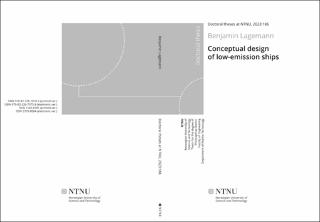Conceptual design of low-emission ships
Doctoral thesis

View/
Date
2023Metadata
Show full item recordCollections
- Institutt for marin teknikk [3432]
Abstract
Human-induced climate change is one of the significant challenges of our time. In order to help limiting global warming, the International Maritime Organization has set out stepwise greenhouse gas emission reduction ambitions for the maritime industry. Other stakeholders exercise pressure to increase the maritime ambition level. Therefore, shipowners and designers today expect emission reduction requirements to tighten over time, but the precise level is currently uncertain.
Against this background, the objective of this thesis has been defined as to “enhance conceptual ship design methodology to cater for greenhouse gas emission reduction ambitions along a ship’s operational lifetime”. The research objective is divided into two research questions. First, how to effectively explore and synthesize low-emission conceptual ship designs? Second, what is an effective method for selecting among alternative ship fuels and power systems under lifetime uncertainty and considering flexibility? For each research question, a working hypothesis is formulated, tested and evaluated through a method called ’validation square’.
The results of this research are disseminated in six main and four supporting papers. From these papers, three main contributions are identified:
C1 The coupling of a set-based approach with modular system-based ship design, a systems architectural model and discrete-event simulation for a case-dependent evaluation of conceptual designs
C2 A method for the selection of the optimal ship fuel and power systems considering flexibility throughout the lifetime
C3 An extension of the deterministic selection method (C2) that concurrently considers uncertainty through multiple stochastic scenarios
Contribution 1 describes a ship synthesis model, and addresses primarily structural and behavioral complexity aspects. By structural complexity it is meant the multitude of possible systems, such as different hull concepts or different energy storage options, that can be combined in different ways. The behavioral complexity is related to the non-trivial system behavior that emerges from the different combinations of subsystem options. The set-based approach denotes an exploration and evaluation of such different options before commitment to one concept. Contribution 2 addresses the selection of fuels and power systems under an assumed certain lifetime scenario. Within this lifetime scenario, fuel costs and carbon prices are changing over time and fuel switches and retrofits are considered as flexibility options. Contribution 3 builds upon the developed selection method under certainty, but additionally considers uncertainty with respect to fuel costs and carbon prices through the sampling of multiple scenarios. The bi-objective nature of the developed stochastic programming method shows the effect of different cost-versus-emission compromises on the selection of ship fuel and power system.
Has parts
Paper 1: Lagemann, Benjamin; Erikstad, Stein Ove. Modular Conceptual Synthesis of Low-Emission Ships. I: 12th Symposium on High-Performance Marine Vehicles. Technische Universität Hamburg-Harburg 2020 s. 134-151Paper 2: Lagemann, Benjamin; Seidenberg, Tobias; Jürgenhake, Christoph; Erikstad, Stein Ove; Dumitrescu, Roman. System alternatives for modular, zero-emission high-speed ferries. Society of Naval Architects and Marine Engineers (SNAME) 2021 Paper Number: SNAME-FAST-2021-054 https://doi.org/10.5957/FAST-2021-054
Paper 3: Lagemann, Benjamin; Lagouvardou, Sotiria; Lindstad, Elizabeth; Kjetil, Fagerholt; Psaraftis, Harilaos; Erikstad, Stein Ove. Optimal ship lifetime fuel and power system selection under uncertainty. Transportation Research Part D: Transport and Environment 2023 ;Volum 119.https://doi.org/10.1016/j.trd.2023.103748 This is an open access article under the CC BY license
Paper 4: Lagemann, Benjamin; Erikstad, Stein Ove; Brett, Per Olaf; Garcia Agis, Jose Jorge. Understanding Agility as a Parameter for Fuel-Flexible Ships. : OnePetro 2022 10 s. SNAME 14th International Marine Design Conference Paper Number: SNAME-IMDC-2022-259 https://doi.org/10.5957/IMDC-2022-259
Paper 5: Lagemann, Benjamin; Lagouvardou, Sotiria; Lindstad, Elizabeth; Kjetil, Fagerholt; Psaraftis, Harilaos; Erikstad, Stein Ove. Optimal ship lifetime fuel and power system selection under uncertainty. Transportation Research Part D: Transport and Environment 2023 ;Volum 119. s https://doi.org/10.1016/j.trd.2023.103748 This is an open access article under the CC BY license
Paper 6: Optimal ship fuel selection under life cycle uncertainty. Transportation Research Procedia 2023 This is an open access article under the CC BY-NC-ND license (https://creativecommons.org/licenses/by-nc-nd/4.0)
Supporting Paper 1: Dæhlen, Jon; Sandvik, Endre; Rialland, Agathe Isabelle; Lagemann, Benjamin. A Method for Evaluating Ship Concepts in Realistic Operational Scenarios using Agent-based Discrete-Event Simulation. COMPIT’21 - 20th Conference on Computer and IT Applications in the Maritime Industries 2 12th Symposium on High-Performance Marine Vehicles, Cortona, 12-14 October 2020, Hamburg, Technische Universität Hamburg, 2020, ISBN 978-3-89220-718-4 © Technische Universität Hamburg
Supporting Paper 2: Lindstad, Elizabeth; Lagemann, Benjamin; Rialland, Agathe Isabelle; Gamlem, Gunnar Malm; Valland, Anders. Reduction of maritime GHG emissions and the potential role of E-fuels. Transportation Research Part D: Transport and Environment 2021 ;Volum 101 https://doi.org/10.1016/j.trd.2021.103075 This is an open access article under the CC BY license
Supporting Paper 3: Erikstad, Stein Ove; Lagemann, Benjamin. Design methodology state-of-the-art report. : OnePetro 2022 20 s. SNAME 14th International Marine Design Conference Paper Number: SNAME-IMDC-2022-301 https://doi.org/10.5957/IMDC-2022-301
Supporting Paper 4: Marginal abatement cost curves (MACCs) for assessing the role of market-based measures (MBMs) in enhancing the adoption of alternative marine fuels Sotiria Lagouvardou, Benjamin Lagemann, Harilaos N. Psaraftis, Elizabeth Lindstad, Stein Ove Erikstad. Preprint; https://doi.org/10.21203/rs.3.rs-2382095/v1 This work is licensed under a CC BY 4.0 License